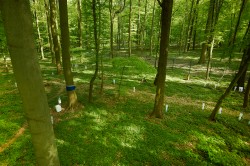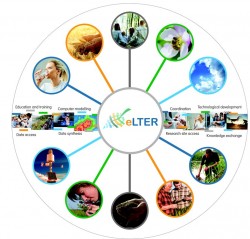Press Release, 06. July 2018
eLTER on European Ecosystem Roadmap ESFRI 2018
An important step for the environmental systems research
The pan-European Long-Term Ecosystem Research Infrastructure (eLTER RI) has been included on the roadmap of the European Strategy Forum on Research Infrastructures ESFRI 2018. This is a significant achievement for the European ecosystem, critical zone and socio-ecological research communities. It paves the way for the development and formalization of eLTER Research Infrastructure (RI). The process is led by the German Helmholtz Centre for Environmental Research (UFZ) in close cooperation with the Environment Agency Austria (EAA) and with support of the German Federal Ministry of Education and Research. 17 countries supported the ESFRI application politically and 161 research institutions in 27 countries signed a common scientific memorandum of understanding.

Photo: UFZ / André Künzelmann

Photo: Stuart Perry of chemical design, UK
In a world of Global Change, multiple stressors act simultaneously at different temporal and spatial scales with significant losses on biodiversity and ecosystem services that eventually affect humanity. While in the short-term such effects are well studied, little is known about long-term and systemic effects and cross-scale interactions among e.g. atmosphere, water, plants and animals. Closing these knowledge gaps requires a much better understanding of the multifaceted environmental system in order to develop appropriate mitigation measures. The eLTER RI features a unique "whole system approach" to observe, explore and analyse the environment, encompassing biological, geological, hydrological and socio-ecological perspectives and interactions from plot to landscape scale, integrated in a nested design. It will deal with the integrated impacts of major stressors on terrestrial, freshwater and transitional water ecosystems across Europe’s eco-climatological zones.
eLTER RI capitalizes on about 450 existing sites of LTER and Critical Zone research in Europe, serving as pools for place-based ecosystem research and research infrastructure development. "Our aim is to secure scientific excellence through the highest quality interoperable services in close interaction with related European and global research structures. Furthermore, we will harmonise existing observations and methods to be prepared for tuned operation in the long run", says Prof. Dr. Georg Teutsch, the Scientific Director of the UFZ. "eLTER RI will provide indispensable integrated data sets covering all system structures and functions and societal aspects as well. This is the base for system model development and validation, which enables us to support predictions and decision-making."
"eLTER entering the ESFRI Roadmap is an important step for Europe to become the world leader in cross-disciplinary terrestrial, freshwater and transitional waters system research. It provides access to integrated research sites and research infrastructures, expert teams and long-term data for multiple user groups", says MinDirig Wilfried Kraus from the Federal Ministry of Education and Research (BMBF).
Next Steps of eLTER
The formal launch of the ESFRI Roadmap 2018 will take place in September back to back with the 4th International Conference on Research Infrastructures (ICRI) from 12 to 14 September 2018 in Vienna.
The next step in the process is to prepare the proposal for a Preparatory Phase Project (PPP 2020-2023), which will develop key components of eLTER RI such as the legal entity, governance structure, Head Office, Topic Centres, the standard observation programme, the physical network of LTER Sites and LTER Platforms included in the RI and the services that the RI will offer to users. The requirements of a wide range of stakeholders will be considered in this process, for example, to take account of emerging strategies in European environmental monitoring.
When fully operational, eLTER RI will be a sustainably funded and managed, distributed infrastructure of field stations covering European environmental zones. Field stations will be designed to support excellent science on the functioning of our life supporting systems (a whole-system approach). The long-term component of eLTER will safeguard that system changes are recorded and potential tipping points of systems can be recognized in time. It will provide a range of services to end users, including access to highly instrumented and expertly staffed sites and to their long-term environmental observation data. Additional services, such as data synthesis and modelling, support for research and technological development, and training programmes, will be provided via Topic Centres. The RI will also provide a range of outputs supporting policy and science users, such as information on the European environmental trends.
ESFRI is the European Strategy Forum on Research Infrastructures. It was formed in 2002 at the behest of the European Council, and is a strategic instrument to develop the scientific integration of Europe and to strengthen its international outreach. The ESFRI mission is to support a coherent and strategy-led approach to policy-making on research infrastructures in Europe, and to facilitate multilateral initiatives leading to the better use and development of research infrastructures, at EU and international level.
For further information about eLTER RI, please see http://www.lter-europe.net/elter-esfri
Further information
Dr. Michael Mirtl
Helmholtz Centre for Environmental Research (UFZ)
michael.mirtl@ufz.de
Prof. Dr. Ingolf Kühn
UFZ-Department Community Ecology
ingolf.kuehn@ufz.de
UFZ press office
Susanne Hufe
Phone: +49 341 6025-1630
presse@ufz.de
In the Helmholtz Centre for Environmental Research (UFZ), scientists conduct research into the causes and consequences of far-reaching environmental changes. Their areas of study cover water resources, ecosystems of the future, environmental technologies and biotechnologies, the effects of chemicals in the environment, modelling and social-scientific issues. The UFZ employs more than 1,100 staff at its sites in Leipzig, Halle and Magdeburg. It is funded by the Federal Government, Saxony and Saxony-Anhalt.
www.ufz.deThe Helmholtz Association contributes to solving major challenges facing society, science and the economy with top scientific achievements in six research fields: Energy; Earth and Environment; Health; Key Technologies; Matter; and Aeronautics, Space and Transport. With some 39,000 employees in 19 research centres, the Helmholtz Association is Germany’s largest scientific organisation.
www.helmholtz.de